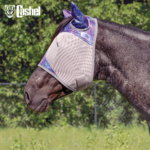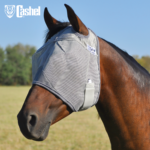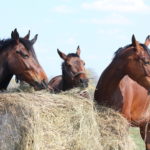 Everyone loves a soft, clean stall, but it should be dirty at times, too.
Everyone loves a soft, clean stall, but it should be dirty at times, too.No Manure – Worries About Impaction: Whether or not a totally clean stall is reason to be worried varies. Some horses pass little manure or urine in their stalls, if they go out for most of the day. Mares are notorious for either only urinating in their stall or only urinating outdoors.
You need to know what is “normal” for your horse. Pay attention during daily stall cleaning. Does your horse normally have three piles of manure? Is a certain area generally wet from urine? Does your mare pee with a sigh of relief as soon as she gets into her stall? Or maybe your wonderful horse pauses on his way in from the pasture to pass a pile of manure before entering the barn.

Be aware that some horses are sensitive. A horse used to having shavings for bedding may balk at urinating on straw. If you find a dry/clean stall and a horse with a decreased appetite or depressed attitude, you should be concerned. This is also true if you notice your horse straining to urinate or pass manure but with no results. Straining with no results is reason to call your veterinarian.
A horse could go a full day or two without passing manure though that isn’t normal. Not urinating becomes an emergency more quickly. Urine that’s held in the body will lead to a buildup of toxins in the blood. Your horse needs to urinate.
Causes for no urination range from dehydration (try the skin-tenting test, below) to bladder stones to kidney failure. Catching dehydration early can mean a quick fix with extra fluids given IV or subcutaneously plus encouraging drinking.

Bladder stones blocking the urethra may require sedation at the least or possibly general anesthesia and surgery. Kidney failure is treated medically but hospitalization with IV fluids 24/7 may be part of the veterinary care.
Horses with bladder stones tend to act irritable and painful. Kidney or renal disease may contribute to a depressed horse, worsening as toxins build. Appetite may be off as well. Bladder stones and kidney problems may first show up as back pain.
Colic and/or an obstruction/impaction can be behind a failure to pass manure. If your horse shows any sign of colic, such as sweating, depression and looking or kicking at his abdomen, contact your vet right away.
BOTTOM LINE
Know your horse’s normals, so you notice early changes in his health.
Article by Contributing Veterinary Editor Deb M. Eldredge DVM.





